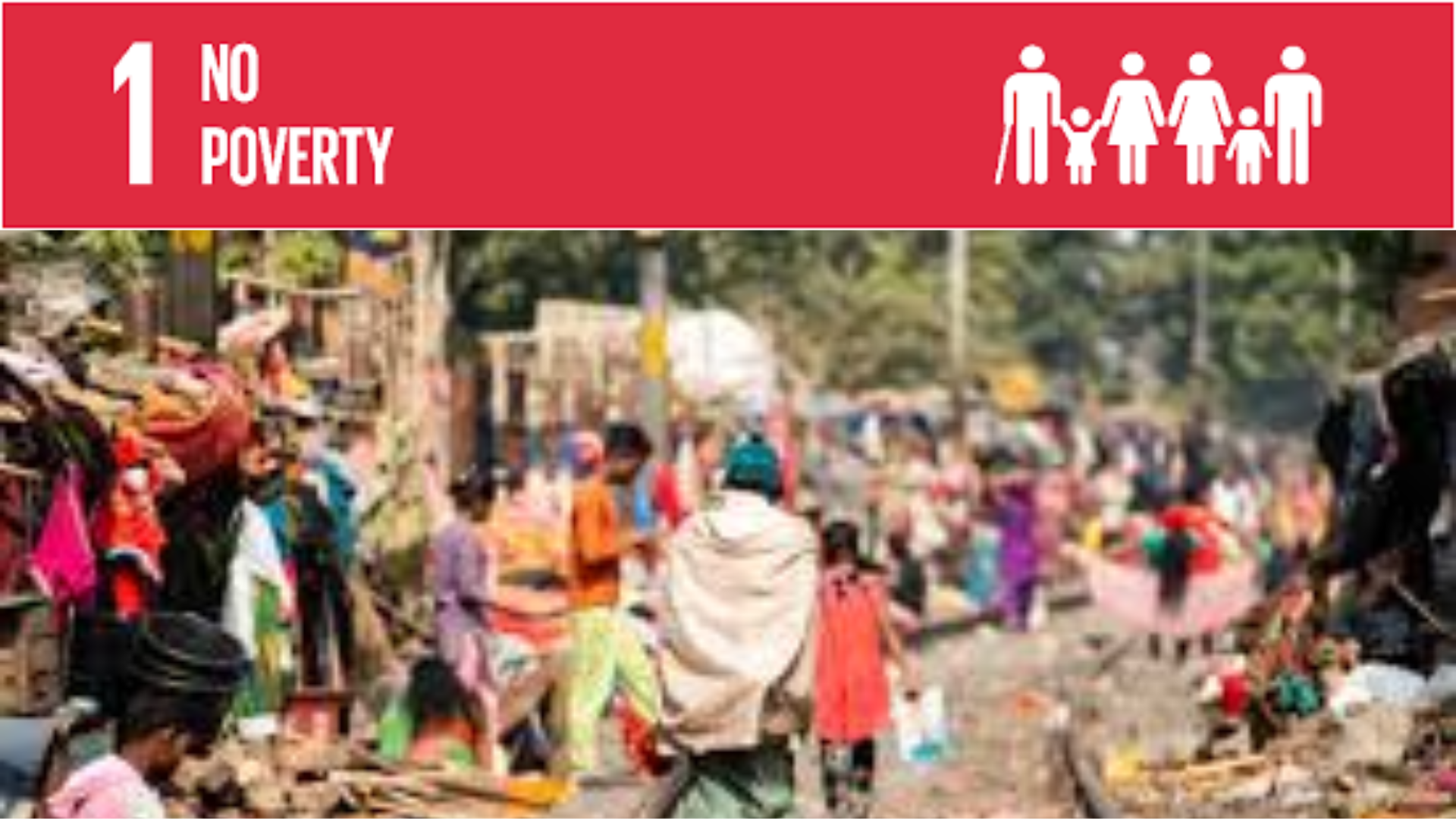🧍♂️ SDG 1: No Poverty
Goal:
End poverty in all its forms everywhere.
🌐 Why SDG 1 Matters
Poverty is more than the lack of income—it limits access to healthcare, education, housing, clean water, and decent living conditions. Ending poverty is foundational to achieving all other Sustainable Development Goals.
-
🌍 Over 700 million people still live in extreme poverty, surviving on less than $2.15 per day (World Bank threshold).
-
📉 The COVID-19 pandemic pushed over 100 million more people into poverty globally, reversing years of progress.
-
🌪️ Climate change, conflict, and inflation are exacerbating poverty, especially in vulnerable regions.
-
👶 Children and women are disproportionately affected, with millions lacking access to basic services.
-
🧑🦼 Poverty often intersects with disability, ethnicity, gender, geography, and social exclusion.
-
🚨 Without urgent action, global poverty will persist for generations, undermining peace, sustainability, and development.
🧭 Key Targets of SDG 1
| Target | Description | Target Year |
|---|---|---|
| 1.1 | Eradicate extreme poverty for all people everywhere (currently below $2.15/day) | 2030 |
| 1.2 | Reduce at least by half the proportion of people living in poverty in all its forms | 2030 |
| 1.3 | Implement nationally appropriate social protection systems for all, including the poor | Ongoing |
| 1.4 | Ensure equal rights to economic resources, access to basic services, ownership and control over land and other assets | Ongoing |
| 1.5 | Build the resilience of the poor and reduce exposure to climate, economic, and social shocks | Ongoing |
| 1.a | Mobilize resources to end poverty through development cooperation | Ongoing |
| 1.b | Create pro-poor and gender-sensitive policies and strategies to support poverty eradication | Ongoing |
📊 Progress and Challenges
Progress:
-
📈 Significant reduction in global poverty rates from 36% in 1990 to around 9% by 2019.
-
💳 Expansion of social protection programs like pensions, child support, and unemployment insurance in many countries.
-
🏥 Increased access to basic services (education, healthcare, housing) in several developing nations.
Challenges:
-
🦠 COVID-19 pandemic halted and reversed decades of poverty reduction.
-
💸 Inflation and rising costs of living disproportionately hurt low-income families.
-
🌪️ Climate-related disasters, such as droughts and floods, push millions into poverty each year.
-
🚧 Many lack access to legal identity, financial services, and secure land tenure.
-
🌍 Sub-Saharan Africa and conflict-affected regions continue to have the highest poverty rates.
-
📉 Global economic inequality is increasing, with the wealth gap widening.
🧠 Who Is Involved?
-
Governments: Develop and fund social safety nets, pro-poor policies, and minimum wage standards.
-
UN Agencies: UNDP, UNICEF, ILO, World Bank support poverty eradication programs and policies.
-
NGOs and Community Groups: Implement local poverty reduction projects, provide education, healthcare, and microfinance.
-
Private Sector: Responsible investment, ethical labor practices, and inclusive employment can lift people out of poverty.
-
Academia and Researchers: Study poverty trends, economic systems, and impact of policies on low-income communities.
-
You!: Support anti-poverty programs, volunteer locally, and advocate for fair policies and equal opportunities.
🌐 International Agreements Supporting SDG 1
-
2030 Agenda for Sustainable Development (2015) – SDG 1 is the first and most foundational goal.
-
Addis Ababa Action Agenda (2015) – Mobilizes financial resources to eradicate poverty.
-
Universal Declaration of Human Rights – Recognizes the right to an adequate standard of living.
-
International Labour Organization (ILO) Recommendations – Support social protection and decent work for all.
🧩 How You Can Help
-
🥫 Support food banks and shelters in your community.
-
💰 Donate to poverty-alleviation programs or microfinance projects.
-
🗳️ Vote for leaders and policies that prioritize economic justice and equality.
-
👩🏫 Educate yourself and others about poverty's causes and solutions.
-
🛍️ Shop ethically – support businesses that pay fair wages and promote worker rights.
-
📦 Organize community drives (food, clothing, school supplies) for underprivileged families.
-
📱 Use your voice on social media to raise awareness and advocate for change.

